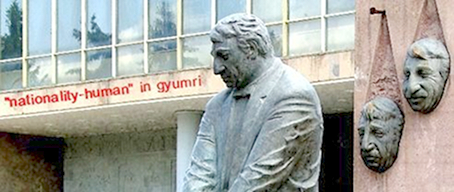
THE FACE OF FRUNZIC’S STATUE IS TIRED AND SAD
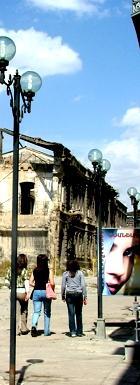
Gyumri - it is already the third year of our festival. I can immediately say that I heard a lot more about this city than the previous two cities. The first thing that comes into mind in association with Gyumri is of course the 102nd Russian military base. The second - is the railroad Gyumri - Kars (Turkey) that doesn’t function, which the Armenian press wrote so much about. And last but not least is that Gyumri along with other cities was a victim of a vicious earthquake in 1988.
The traces of a 20-year-old earthquake are visible even today. You can still see semi-damaged and fallen buildings that were completely destroyed in different regions of Gyumri. It cannot be said that there are many of them; never the less they are clearly evident.
By the way, many of the natives say that the majority of the building that suffered were the building, which were made during the Soviet period, and the 100-year-old buildings withstood the tremors.
I liked the city. There is a feeling of a certain uncanny eastern charm within it. Perhaps it’s the expression of the vicinity of the Turkish border...
Also a famous actor, Frunzic Mkrtchyan played in a local theatre, and he himself was a native of Gyumri. There is a statue in front of the theatre to honor his memory, where he sits like a child with his hands on his knees and feet under the chair. There is a fireplace made of stone beside him with two masks engraved into it, a happy and a sad face of the actor portrait the masks – the tragedy and the comedy of one actor.
Frunzic’s statue has a tired and a sad expression on his face.
Currently, the city center is covered with constructions. A church is being restored on one of the main plazas; the plaza itself is being restored, the Mayer’s building is being built. Judging from the size of the future workplace of this city’s leader, it is evident that there will be over a hundred officials taking care of their citizens.
The interior work has already begun on the new Meyer’s building. The size of the building is colossal it occupies one forth of the plaza. At first I thought there is going to be some sort of a business center or as a minimum a university. “No”, - disappointed me the cab driver,- “Our Meyer will be sitting in that building”.
The traces of a 20-year-old earthquake are visible even today. You can still see semi-damaged and fallen buildings that were completely destroyed in different regions of Gyumri. It cannot be said that there are many of them; never the less they are clearly evident.
By the way, many of the natives say that the majority of the building that suffered were the building, which were made during the Soviet period, and the 100-year-old buildings withstood the tremors.
I liked the city. There is a feeling of a certain uncanny eastern charm within it. Perhaps it’s the expression of the vicinity of the Turkish border...
Also a famous actor, Frunzic Mkrtchyan played in a local theatre, and he himself was a native of Gyumri. There is a statue in front of the theatre to honor his memory, where he sits like a child with his hands on his knees and feet under the chair. There is a fireplace made of stone beside him with two masks engraved into it, a happy and a sad face of the actor portrait the masks – the tragedy and the comedy of one actor.
Frunzic’s statue has a tired and a sad expression on his face.
Currently, the city center is covered with constructions. A church is being restored on one of the main plazas; the plaza itself is being restored, the Mayer’s building is being built. Judging from the size of the future workplace of this city’s leader, it is evident that there will be over a hundred officials taking care of their citizens.
The interior work has already begun on the new Meyer’s building. The size of the building is colossal it occupies one forth of the plaza. At first I thought there is going to be some sort of a business center or as a minimum a university. “No”, - disappointed me the cab driver,- “Our Meyer will be sitting in that building”.
THE GYUMRI CAB DRIVER
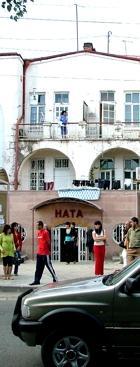
By the way, about the Gyumri cab drivers. During my visit I became convinced that the majority of them doesn’t know the city.
Passing by a plaza down town, where a statue of a girl with a cross, I asked the cab driver what the name of the plaza. “Lenin’s Square dear friend” he answered without thinking. “ Is it possible that the name hasn’t been changed?” - I wondered. The cab driver thought for a couple of seconds: “Of course it has been changed” I asked for the “modern” name. Once again the driver thought for a couple of seconds and silently pulled up to the sidewalk. “There, it is written on the wall”, - and he pointed to the tableau which stated “Independence Square”. . .
I thanked the good cab driver and we continued the trip. After awhile he turned to me with the question: “And what was written there?” “Yeah” our driver mumbled semi skeptically in a form of a question after I answered his question. Perhaps he disliked the fact of the square’s name change. Or perhaps he was skeptical to independence? We should probably ask him about it...
Then a couple of times afterwards when we caught a cab we dictated to the drivers where to go and what turn to take to get there efficiently.
Passing by a plaza down town, where a statue of a girl with a cross, I asked the cab driver what the name of the plaza. “Lenin’s Square dear friend” he answered without thinking. “ Is it possible that the name hasn’t been changed?” - I wondered. The cab driver thought for a couple of seconds: “Of course it has been changed” I asked for the “modern” name. Once again the driver thought for a couple of seconds and silently pulled up to the sidewalk. “There, it is written on the wall”, - and he pointed to the tableau which stated “Independence Square”. . .
I thanked the good cab driver and we continued the trip. After awhile he turned to me with the question: “And what was written there?” “Yeah” our driver mumbled semi skeptically in a form of a question after I answered his question. Perhaps he disliked the fact of the square’s name change. Or perhaps he was skeptical to independence? We should probably ask him about it...
Then a couple of times afterwards when we caught a cab we dictated to the drivers where to go and what turn to take to get there efficiently.
GYUMRI, RUSSIA, CHINA
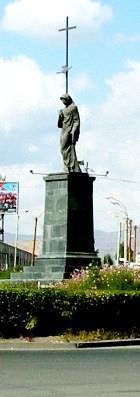
It’s very easy to find yourself around in Gyumri because there are a lot more street names in Russian in Gyumri then in any other Armenian city. English writings are but a few. Perhaps it’s the influence of the military base. Although as strange as it may seem I saw very little of the Russian military personnel in the city. The majority of them I saw were often Armenians in Russian uniforms with military air force chevrons.
As the local journalists told me, the representatives of the Russian military and their families live secluded from the rest of the population on the campus of the base. The infrastructure of the campus allows them to live in autonomy. They also say that the base will be broadening and in the near future a couple of additional areas on the west side of Gyumri will be included to all the current areas of the base.
There are also rumors that Moscow will open the control headquarters of all its military bases in South Caucasus there. Something along the lines of the Russian headquarters that was moved out of Georgia a couple of years ago. Of course they also say that the Gyumri headquarters will be controlling all Russian military bases in Armenia, South Ossetia, and Abkhazia.
It’s interesting, but when I was asking the locals about how real is the opening of the borders with Turkey for railroad transit, the majority answered, that it’s possible but unlikely to happen in the near future. Some even added, “If Moscow allows it, they’ll open”.
Judging from everything, everyone in Gyumri loves Russia. Even on a children’s carousel in a Local Park there is a sign Gyumri, Russia, China, not completely comprehensible. Perhaps it symbolizes the of fraternity of people from individually chosen countries and one city.
As the local journalists told me, the representatives of the Russian military and their families live secluded from the rest of the population on the campus of the base. The infrastructure of the campus allows them to live in autonomy. They also say that the base will be broadening and in the near future a couple of additional areas on the west side of Gyumri will be included to all the current areas of the base.
There are also rumors that Moscow will open the control headquarters of all its military bases in South Caucasus there. Something along the lines of the Russian headquarters that was moved out of Georgia a couple of years ago. Of course they also say that the Gyumri headquarters will be controlling all Russian military bases in Armenia, South Ossetia, and Abkhazia.
It’s interesting, but when I was asking the locals about how real is the opening of the borders with Turkey for railroad transit, the majority answered, that it’s possible but unlikely to happen in the near future. Some even added, “If Moscow allows it, they’ll open”.
Judging from everything, everyone in Gyumri loves Russia. Even on a children’s carousel in a Local Park there is a sign Gyumri, Russia, China, not completely comprehensible. Perhaps it symbolizes the of fraternity of people from individually chosen countries and one city.
FESTIVAL
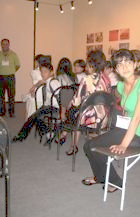
I was disappointed with the festival in Gyumri. Everything seemed very sharply organized; they would bring children from neighboring counties for the viewing and take them back in the same organized manner.
In the beginning of the film the host would tell them what film they’re going to see and would explain what is going to be shown and what the speech is about in the film. After that you could practically not even watch the movie.
In its entirety you could characterize the whole situation as a lesson that was being taught by a few very strict but just teachers at once.
A guest named Marko especially shocked me. As they explained to us Marko is a migrant from Iran who converted to Christianity and changed his name, and wants to take up Armenian citizenship. His profession is a helicopter pilot.
After the show Marko would get up on the stage in front of the white screen and would start discussions. The children would take turns to express their opinions about the film and answered the questions. I got the impression that they are answering a well-studied lesson. They used sharpened phrases about the necessities of establishing world peace, fraternity of nations, patriotism.
The teachers would nod their heads in satisfaction after the kids would answer, gently viewing at the good students. For instance if someone answered wrong or (oh the horror) expressed his or her own opinion, the teachers would obviously be unsatisfied give a very unwelcoming look to the bad student.
One of the girls began saying something from her place. When Marko interrupted her by saying: “Young lady! Raise your hand to ask for a word. Stand up. Speak. Now you may sit.” Marko obviously was an adept of strict discipline, or he just was used to it himself.
If the children’s answers did not satisfy Marko, or if someone would express an opinion differing from his opinion, he would explain to them, with an evident sad look in his eyes, that they misunderstood this or the other film.
Having explained the film «Correctly», Marko, with a sense of a very heave but a holly mission, would ask “Do you understand everything now children?” the children would obediently nod their heads.
After viewing the film “Punjabi cab” Marko explained to the children that Sikhs, one of whom was our main character, in reality are very strange people. And the majority of them you can’t really consider as good people, also that as a minimum you should be careful with them.
After viewing the film about Afghanistan, Marko explained the differences between the religious and civil laws of that country. Told about how Afghanis buy wives for themselves, about the oppression of women’s rights in Islamic countries, that money plays the main role in the marriage. Offered to contemplate about the horrible future in Islamic countries.
Actually it’s worth to mention that Marko got distracted on the subject of religion on more that one occasion. “You’re all lucky to be Christians. Islam – horrifying religion!” The teachers were nodding their heads in agreement to the beat of his words. And peacemaker Marko was smiling with satisfaction.
After viewing the film about the Arab - Israeli conflict the history teacher asked to speak. Marko invited her on stage.
After getting up on stage the teacher shouted out into the audience “We are not occupants!!!” From the unexpected surprise I dropped the notebook on the floor. The audience became silent. The children understood that they’ll have to answer to this lesson later, and it will be for their own good if they keep this lesson stored in their minds.
Basically she explained that Nagorny Karabakh was passed to Azerbaijan by the Soviet Union, and if Azerbaijan returned it voluntarily there would not have been a conflict. And the same thing is happening in South Ossetia who wants to live on its historical ground. «Everyone must accept the justification of history, and that would prevent wars. Everyone has a pre homeland and that’s a fact that everyone seriously consider! I know the history!” She ended her speech.
Marko understood his mistake. He said that the Nagorny Karabakh conflict cannot in any way be compared with the Arab-Israeli counter-resistance. He explained that in 1949 Israel honestly bought land from Arabs, now the Arabs are demanding back what their ancestors have sold.
Marko and the teacher were standing on stage; they were discussing the differences between these two conflicts with such inspiration that the children became overly bored. Soon they became completely indifferent and began to discuss their own problems and secrets.
One day a polish girl from the “Peace-Corpse” came to the festival. Having viewed one of the films, during the discussion she raised the question of virginity in Caucasus.
“This question concerns me very much”, - she told about her feelings. – “ There are so many virgins in Caucasus!” The teachers as if by a command became jumpy and began to pay attention to the student’s reactions. The boys had cunning smiles and the girls turned red.
The new subject inspired Marko. He continued the conversation with the ambassador from the “Peace-Corpse”, once again the children became bored because the speech continued in English and the interpreter couldn’t keep up with the lively conversation of this all Caucasian problem.
In the beginning of the film the host would tell them what film they’re going to see and would explain what is going to be shown and what the speech is about in the film. After that you could practically not even watch the movie.
In its entirety you could characterize the whole situation as a lesson that was being taught by a few very strict but just teachers at once.
A guest named Marko especially shocked me. As they explained to us Marko is a migrant from Iran who converted to Christianity and changed his name, and wants to take up Armenian citizenship. His profession is a helicopter pilot.
After the show Marko would get up on the stage in front of the white screen and would start discussions. The children would take turns to express their opinions about the film and answered the questions. I got the impression that they are answering a well-studied lesson. They used sharpened phrases about the necessities of establishing world peace, fraternity of nations, patriotism.
The teachers would nod their heads in satisfaction after the kids would answer, gently viewing at the good students. For instance if someone answered wrong or (oh the horror) expressed his or her own opinion, the teachers would obviously be unsatisfied give a very unwelcoming look to the bad student.
One of the girls began saying something from her place. When Marko interrupted her by saying: “Young lady! Raise your hand to ask for a word. Stand up. Speak. Now you may sit.” Marko obviously was an adept of strict discipline, or he just was used to it himself.
If the children’s answers did not satisfy Marko, or if someone would express an opinion differing from his opinion, he would explain to them, with an evident sad look in his eyes, that they misunderstood this or the other film.
Having explained the film «Correctly», Marko, with a sense of a very heave but a holly mission, would ask “Do you understand everything now children?” the children would obediently nod their heads.
After viewing the film “Punjabi cab” Marko explained to the children that Sikhs, one of whom was our main character, in reality are very strange people. And the majority of them you can’t really consider as good people, also that as a minimum you should be careful with them.
After viewing the film about Afghanistan, Marko explained the differences between the religious and civil laws of that country. Told about how Afghanis buy wives for themselves, about the oppression of women’s rights in Islamic countries, that money plays the main role in the marriage. Offered to contemplate about the horrible future in Islamic countries.
Actually it’s worth to mention that Marko got distracted on the subject of religion on more that one occasion. “You’re all lucky to be Christians. Islam – horrifying religion!” The teachers were nodding their heads in agreement to the beat of his words. And peacemaker Marko was smiling with satisfaction.
After viewing the film about the Arab - Israeli conflict the history teacher asked to speak. Marko invited her on stage.
After getting up on stage the teacher shouted out into the audience “We are not occupants!!!” From the unexpected surprise I dropped the notebook on the floor. The audience became silent. The children understood that they’ll have to answer to this lesson later, and it will be for their own good if they keep this lesson stored in their minds.
Basically she explained that Nagorny Karabakh was passed to Azerbaijan by the Soviet Union, and if Azerbaijan returned it voluntarily there would not have been a conflict. And the same thing is happening in South Ossetia who wants to live on its historical ground. «Everyone must accept the justification of history, and that would prevent wars. Everyone has a pre homeland and that’s a fact that everyone seriously consider! I know the history!” She ended her speech.
Marko understood his mistake. He said that the Nagorny Karabakh conflict cannot in any way be compared with the Arab-Israeli counter-resistance. He explained that in 1949 Israel honestly bought land from Arabs, now the Arabs are demanding back what their ancestors have sold.
Marko and the teacher were standing on stage; they were discussing the differences between these two conflicts with such inspiration that the children became overly bored. Soon they became completely indifferent and began to discuss their own problems and secrets.
One day a polish girl from the “Peace-Corpse” came to the festival. Having viewed one of the films, during the discussion she raised the question of virginity in Caucasus.
“This question concerns me very much”, - she told about her feelings. – “ There are so many virgins in Caucasus!” The teachers as if by a command became jumpy and began to pay attention to the student’s reactions. The boys had cunning smiles and the girls turned red.
The new subject inspired Marko. He continued the conversation with the ambassador from the “Peace-Corpse”, once again the children became bored because the speech continued in English and the interpreter couldn’t keep up with the lively conversation of this all Caucasian problem.
FORWARD, TO YEREVAN!

We left from Gyumri to the next city of the festival - Yerevan. The road passed through deserted rocky hills that were burnt by the sun.
In a depression between two rocky hills was laying a skeleton of a bus. Some sort of a predator bird was hovering over it. Dry grass was burning on the horizon near a mountain. The smoke was mixing with the low clouds. And the scattered red stones added a touch of an apocalyptic touch to the scene.
Suddenly a siren went on behind us. A police car was catching up to us. The driver pulled over and got out of the car. So did we. The police became curious who we were, where we are going and where did we depart from, as soon as they saw a photo camera in my hands. So we gave an explanation. They took our friend to the side, after awhile he returned.
«Did they fine you?» - we asked. «I gave them money», - he answered spitting out of the window. – «They asked for 10000, we agreed on 3000».
One our before we reach Yerevan.
Irakli Chikhladze
September 2008
Gyumri, Armenia
Published: 15-01-2009
This article is made during the South Caucasus Film Festival of Peace and Human Rights in Armenia implemented by Caucasus Center of Peace-Making Initiative by support of the Eurasia
Partnership Foundation
and the American People through
the United States Agency
for International Development (USAID)
In a depression between two rocky hills was laying a skeleton of a bus. Some sort of a predator bird was hovering over it. Dry grass was burning on the horizon near a mountain. The smoke was mixing with the low clouds. And the scattered red stones added a touch of an apocalyptic touch to the scene.
Suddenly a siren went on behind us. A police car was catching up to us. The driver pulled over and got out of the car. So did we. The police became curious who we were, where we are going and where did we depart from, as soon as they saw a photo camera in my hands. So we gave an explanation. They took our friend to the side, after awhile he returned.
«Did they fine you?» - we asked. «I gave them money», - he answered spitting out of the window. – «They asked for 10000, we agreed on 3000».
One our before we reach Yerevan.
Irakli Chikhladze
September 2008
Gyumri, Armenia
Published: 15-01-2009
